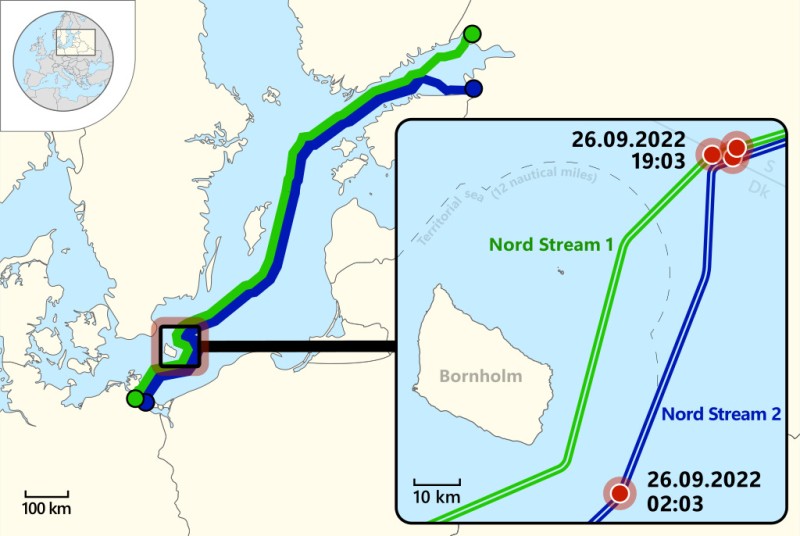Whatever findings they ultimately unveil could pose a political challenge for Berlin and the rest of Europe. Politicians are already apprehensive about the potential outcomes of this sensitive investigation.
A six-month-long probe conducted by reporters from Der Spiegel and the TV station ZDF seems to confirm what U.S. intelligence has asserted from the start: a group of Ukrainian specialists chartered a sailboat and planted the explosives that ruptured three of the four pipes comprising Nord Stream 1 and 2.
Abundant traces of octogen, an underwater explosive, were discovered aboard the sailboat "Andromeda," which the suspects had chartered in the German port town of Warnemünde on the Baltic Sea. Reporters chartered the same vessel, retraced the perpetrators' route, and attempted to locate some of the crew members responsible for the pipelines’ explosion.
Andromeda was chartered on September 6 last year through a Warsaw travel agency that lacks a website, phone number, offices, or employees.
The agency's manager, Nataliia A., 54, resides in Kyiv and seems to lack any experience in tourism. When reporters called her Ukrainian mobile phone, she hung up as soon as they identified themselves as journalists. A few days later, an individual claiming to be a police officer returned the call and threatened to sue the reporter for stalking.
When they arrived in Warnemünde to board the yacht, the suspects presented a Romanian passport in the name of Ștefan Marcu. Along with colleagues from the investigative networks Rise Moldova and OCCRP, the reporters managed to track him down and find out that the 60-year-old had no involvement in the attack. His passport had expired a month after the attack, but somehow his information was used to create a new one but with the photo of a 20-year-old.
Reporters believe the person in the photo is actually a man known as Valeri K. from Dnipro, Ukraine, who is currently serving in the Ukrainian Army’s 93rd Brigade. However, the photo could also have been misused as DNA samples taken from traces left on Andromeda and samples taken from Valeri's son have not matched.
Whoever they are, the five men and one woman appear to have executed the attack without informing the Ukrainian leadership. Ukrainian President Volodymyr Zelensky said in the aftermath of the bombing that he would never have approved such an operation.
The sabotage is deemed the most severe assault on German national security, and the investigation is considered amongst the most crucial, and potentially politically explosive, since World War II.
Not that other outcomes of this probe would be more favorable for Berlin.
Some speculate that Moscow might be behind the attack. That its agents had left a false trail of evidence to lead investigators to Kyiv, in order to turn public opinion against Ukraine.
Possible, but if Russia is truly to blame, could the attack be viewed as an act of war, Der Spiegel asked. Would Article 5 be invoked, stating that an attack on one member is an attack on the entire Alliance, thus necessitating a collective response? Could this lead to the dissolution of the Alliance?
While it's possible that Russia is responsible, it's not probable. The pipelines represent a significant source of income for Moscow.
From the outset, the Nord Stream 2 project faced criticism from Germany's allies. The United States, the United Kingdom, Poland, and Ukraine argued that it would heighten German reliance on Russian gas and give Moscow the ability to blackmail Berlin.
On the other hand, if it was Ukraine that blew up the pipelines to deprive Moscow of the income it relies on to sustain its aggression, how would Germany react? Should Berlin continue sending tanks and fighter jets to Kyiv?
And if the U.S. or the U.K. had any involvement in the attack, could it jeopardize a 80-year-long partnership?
If one thing is clear, the sabotage highlights how vulnerable critical infrastructure can be to any nation’s security. Countries like North Korea, Iran, and other unfriendly states are now closely observing the fallout, waiting to see what the response will be.
Should the culprits ultimately evade justice, it could embolden future attacks against other critical targets such as internet nodes, oil pipelines, or nuclear plants.
One way or the other, Der Spiegel claims, the investigation has put politicians between a rock and a hard place.



